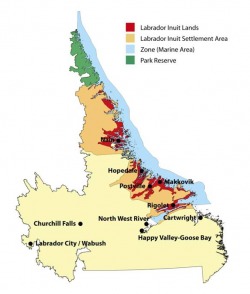Nunatsiavut Regional Workshop

Are you living in Nunatsiavut and interested in your region's development?
Or, are you faculty, staff or a student at Memorial University who would like to strengthen Memorial's presence and make a difference in the lives of people in Nunatsiavut?
If so, consider attending the Harris Centre's Regional Workshop on May 1, 2014 at Atsanik Lodge, Nain from 8:30am-4:00pm.
There will also be a Memorial Presents public forum from 7:00-9:00pm the evening before the workshop. Dr. Kirk Anderson, Dean of the Faculty of Education, will present on the education system in Nunatsiavut, along with two local panelists.
The following themes have been developed with a local planning committee. While we may not be able to address all of the issues or questions, the workshop will provide a forum to discuss them. Issues within each theme may also be impacted by climate change, so this will be a theme that runs throughout the entire workshop.
Community wellbeing
- Provision of services, products, programs, and activities that promote both physical and mental health and wellness.
- Educational system issues, such as available services, effects of the Inuktitut immersion program, graduation rates, and enrollment in post-secondary education.
- Justice system concerns, including the court process, sentencing, rehabilitation of offenders, and effects that offenders have on community wellbeing.
- Preserving and promoting the unique cultural heritage of Labrador Inuit.
Sustainable economic development
- Supports, capacity, and ways for small businesses to develop and overcome barriers to success.
- Opportunities for industry, such as mining and alternative energy, to develop in a sustainable way that respects both the environment and culture.
- Benefits for the region from business and industrial development, such as providing careers for local workers who would otherwise need to relocate or be unemployed.
Infrastructure advancement
- State of water quality and waste management services, and possible ways to improve them.
- Condition, maintenance, and development of transportation infrastructure, including roads, ferries, and airstrips.
- Access to adequate communications services, such as cell phone and internet coverage.
- Development of appropriate facilities and housing to serve the population.
Please contact Amy Tucker at amy.tucker@mun.ca or 864-6115 if you have any questions or would like to register, as space is limited.